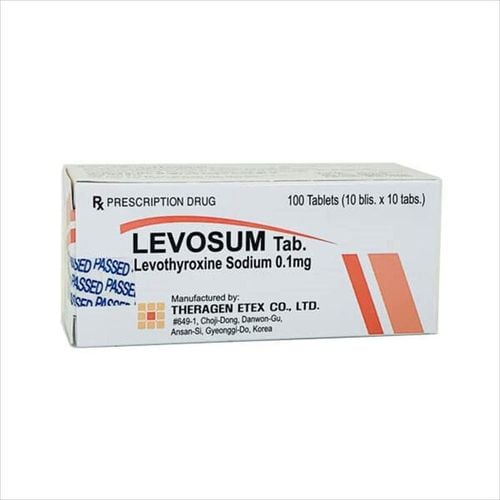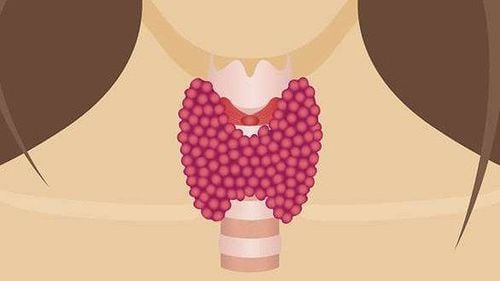This is an automatically translated article.
This article is professionally consulted by Master, Doctor Vu Thi Duyen - Department of Medical Examination & Internal Medicine - Vinmec Hai Phong International General Hospital.Hyperthyroidism is a medical condition caused by an overactive thyroid gland that secretes too much thyroid hormone into the bloodstream. This disease is common in adults, especially women, with the typical form of Graves' disease, but sometimes in fact, hyperthyroidism is also seen in infants and young children.
1. What is hyperthyroidism?
The thyroid is a small butterfly-shaped gland located in the neck area. The main function of the thyroid gland is to secrete these hormones and hormones to help the body control metabolism, and at the same time regulate how fast or slow the organs use energy.Hyperthyroidism is a condition in which the thyroid gland increases the secretion of thyroid hormones T3 and T4 into the body's circulatory system. The increased secretion of these hormones leads to an overactive metabolism of the body. Hormones T3 and T4 travel through the blood throughout the body, affecting the organs involved, disrupting the body's homeostasis regulation, leaving the body uncontrollable.
2. Causes of hyperthyroidism in children
There are many causes of hyperthyroidism in children:The leading cause in children is Basedow, accounting for 98%. Congenital inflammatory diseases of the thyroid gland. Prolonged use of iodine for the prevention of goiter alone also leads to hyperthyroidism. Hyperthyroidism in newborns, the main cause is because the mother of the child has or is having hyperthyroidism. Research shows that if the mother has hyperthyroidism, 2% of the newborns will also have hyperthyroidism.

3. What are the signs of hyperthyroidism in children?
Clinical symptoms of hyperthyroidism can include 3 main signs:Typical clinical symptoms of hyperthyroidism
Increased metabolism: Fatigue, fear of heat, thin weight loss, thirst and overeating, or sweating foul. Cardiovascular symptoms: Palpitations, tachycardia, tired breathing, slightly decreased systolic blood pressure. Children may cry easily, easily get excited, hyperactive, emotional, sleep poorly Muscle weakness, tremors, tremors in fingers. Thyroid: A visible or palpable goiter that is sometimes heard with a murmur is also known as hemangioma.
There are signs of bulging eyes, glittering eyes or eyelid edema.
There are also other manifestations such as
Poor concentration, only for a short time. Weight loss, slow growth. Sometimes, upper eyelid drooping and less blinking. The skin is thin, red, warm to the touch, especially on the palms, neck and face. There are episodes of sweating, increased body temperature. Delayed puberty, missed periods, or less menstrual periods than usual. The disease is easily confused with a simple goiter.
4. Signs of hyperthyroidism in babies
If the mother has been or is being treated for hyperthyroidism, the baby may have symptoms of hyperthyroidism after birth such as: fussiness, rapid breathing, digestive disorders, bulging eyes, retraction of the upper eyelid, edema around the eyelids. and sometimes a visible goiter.5. Is hyperthyroidism dangerous in children?
Hyperthyroidism in children can cause complications such as:Cardiovascular complications: Can cause arrhythmia, heart failure. Psychiatric: Agitation, confusion, delirium. Musculoskeletal system: Muscle weakness or paralysis. Acute thyrotoxicosis: This is a medical emergency that, if not treated promptly, can lead to death. The illness comes on suddenly, with symptoms such as elevated body temperature, sweating, vomiting, diarrhea, agitation, delirium, muscle paralysis, coma, very fast heartbeat, arrhythmia, heart failure and eventually lead to cardiovascular collapse.
6. Tests to help diagnose hyperthyroidism

7. Treatment of hyperthyroidism in children
Treatment of hyperthyroidism in children gives priority to medical treatment, if in the case of medical treatment, the pediatric patient relapses many times or there are no results, other methods such as radioactive iodine or surgery are used. .Medical treatment: Using Thiouracil-based anti-thyroid drugs, the two most commonly used drugs are Propylthiouracil (PTU) and Methimazole. The drug has the effect of inhibiting the process of combining organic iodine with tyrosin in the thyroid gland to produce T3, T4. Methimazole (Neo-mercazole tablets: 5mg - 20mg), loading dose: 0.5 - 1 mg/kg/day (divided 3-4 times orally) up to 50mg/day. Or PTU: 5-10mg/kg/day divided into 3 times.
Attack period lasts 2 - 3 months.
When thyroid function tests return to normal, switch to maintenance therapy with the dose gradually reduced to the minimum level that T3 T4 remains normal.
Radioiodine treatment: In case medical treatment is ineffective or contraindicated.
Surgical treatment: Surgery to remove the thyroid gland if medical treatment is not effective and the disease recurs many times.
8. Treatment of hyperthyroidism in infants
Medical treatment:PTU: 5-10 mg/kg/day divided into 3 times or Neo-mercazole 1mg/kg/3 times daily. The average duration of treatment is 6 weeks, treatment can be stopped when T3 and T4 are normal and there are no antithyroid antibodies circulating in the blood. Corticosteroids can be added or thyroxine 1-3μg/kg/day for a few days and then gradually reduced to avoid hypothyroidism.
9. Prevention of hyperthyroidism in children
Because hyperthyroidism is mainly caused by inside the body, parents can hardly prevent absolutely for their children. Parents need to monitor and care for children to detect early manifestations of hyperthyroidism for timely diagnosis and treatment. In order to increase the effectiveness of the treatment, the child should be given a reasonable rest, always keep a comfortable mind, and avoid anxiety and excessive emotions.Appropriate diet such as:
Eat more protein, fruits, vegetables and add vitamins of group B...
Limit the use of foods that contain a lot of iodine or use iodized salt .
Take the child to a specialist for examination as soon as in doubt.

9. Where is the prestigious medical examination of children for hyperthyroidism?
The Department of Endocrinology - Diabetes - Department of General Internal Medicine - Vinmec International General Hospital is a reliable address for parents to send their children's health. The Department of Endocrinology belongs to the field of internal medicine, undertaking examination, diagnosis and treatment, based on disease characteristics - chronic diseases related to dysfunction of the endocrine system and hormones.Common diseases include: thyroid disorders, hyperthyroidism, thyroiditis, thyroid cancer, Grave-Basedow's disease, diabetes, cholesterol disorders, pituitary and adrenal gland disorders, birth hormone disorders obstetrics, hypoglycemia, osteoporosis, rickets and osteomalacia, pituitary disorders, pituitary tumors,...
Specializes in applying new techniques in disease treatment: treating benign thyroid nodules with radiofrequency ablation technique (avoiding thyroid surgery for patients). In particular, there is a team of well-trained and experienced medical doctors.
If you have a need for consultation and examination at Vinmec Hospitals under the nationwide health system, please book an appointment on the website for service.
Please dial HOTLINE for more information or register for an appointment HERE. Download MyVinmec app to make appointments faster and to manage your bookings easily.














